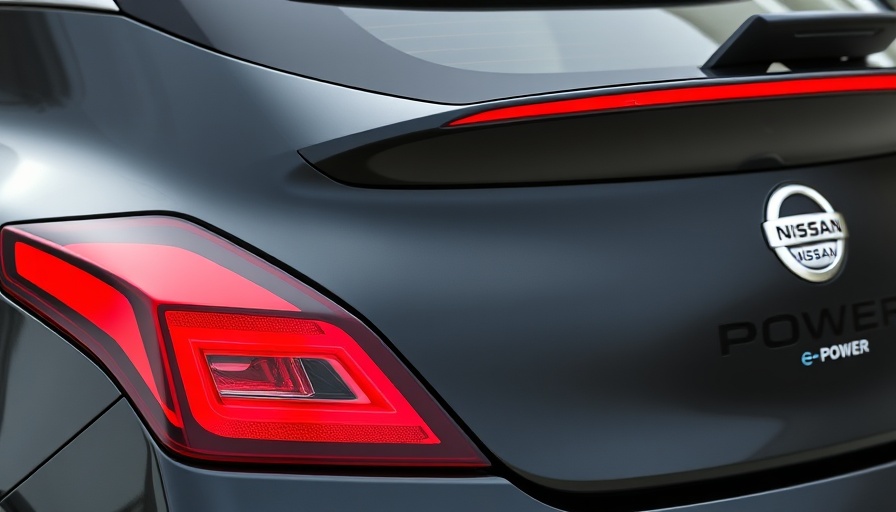
Revolutionizing Engine Design: Nissan's Cold-Spray Technology
Nissan, a name synonymous with innovation, is again making headlines with its groundbreaking engine technology. The automotive landscape is in constant evolution, with manufacturers pushing the envelope to create engines that not only perform better but also leave a lighter environmental footprint. This time, Nissan is leveraging cold-spray technology to redefine how engines are constructed, raising the bar for efficiency and performance.
A Leap Forward with the ZR15DDTe Engine
The company’s new engine, the 1.5-liter turbocharged inline-three, dubbed the ZR15DDTe, incorporates a unique approach to creating valve seats. Unlike the traditional method of pressing pre-made rings into the cylinder head, Nissan's cold-spray technique involves spraying a copper-based alloy directly onto the aluminum surface. This revolutionary process enhances the integration of the valve seat with the engine, resulting in a more resilient and efficient design.
Understanding Cold-Spray Technology
The innovation of cold-spray technology is particularly significant because it allows for a stronger bond between different materials without melting them. This is crucial for engine components that are subjected to extreme conditions. By speeding up powder particles to supersonic speeds, Nissan achieves a level of precision that ensures durability and resistance against wear and tear, a key factor in maintaining performance over time. As vehicle longevity continues to be a priority for consumers, this technology stands to address long-standing concerns about engine reliability.
Enhanced Airflow and Combustion Efficiency
Nissan's cold-spray application does more than just create a robust valve seat; it also improves engine design. The new technique facilitates better shaping of the intake port, leading to enhanced tumble flow—the swirling movement of air and fuel as they enter the combustion chamber. This optimal mixture is critical for reducing the likelihood of knocking and misfires, which not only improves fuel efficiency but also contributes to achieving a remarkable 42% thermal efficiency for the ZR15DDTe engine. For perspective, only a handful of high-tier engines can lay claim to such a number, underscoring Nissan's leadership in this space.
Nissan's e-Power Technology: Bridging Conventional and Electric
While the ZR15DDTe engine showcases Nissan's advancements in conventional engine technology, their e-Power system marks a significant step in the hybrid space. Currently available in Europe, models like the Nissan Qashqai with e-Power are gaining traction for their blend of electric efficiency and traditional engine power. This dual approach not only enhances performance but also caters to diverse consumer preferences in vehicles. As environmental regulations tighten globally, Nissan's commitment to a hybrid approach exemplifies future trends in automotive engineering that prioritize sustainability alongside performance.
Why This Matters: Implications for Consumers
Nissan's innovations are not purely academic; they have real-world implications for car buyers. With rising fuel prices and increasing scrutiny over emissions, consumers are actively seeking vehicles that promise lower running costs while delivering high performance. The cold-spray technology and e-Power systems present Nissan as a viable option for those weighing the pros and cons of traditional versus hybrid vehicles.
A Vision for the Future of Automotive Technology
As Nissan continues to innovate, the automotive industry's future looks promising. The company's ongoing research in cold-spray technology can inspire other manufacturers to adopt similar methods, potentially leading to a wider industry shift towards maximizing efficiency and performance. For consumers, understanding these technological advancements can inform purchase decisions, aligning them with brands that not only deliver but innovate.
Takeaway for Prospective Buyers
If you're in the market for a vehicle, these advancements signal that 2024 is poised to be a pivotal year for automotive technology. Nissan’s commitment to refining their engines could lead to cars that aren't just more powerful but also safer and more environmentally friendly.
Learn more about Nissan's cutting-edge engine technology and explore other exciting features designed for the best cars of 2024 before making your next purchase decision.
 Add Row
Add Row  Add
Add 




Write A Comment